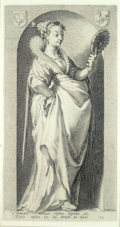Seven Deadly Sins
 From Conservapedia
From Conservapedia In some Christian traditions, the Seven Deadly Sins, or more properly, the Seven Capital Vices are considered to be the seven vices with "certain fundamental reasons for moving the appetite" "which give rise to others".[1] They are Pride, Envy, Anger, Sloth, Greed, Gluttony, and Lust.
Contents
Sins[edit]
Pride[edit]
Pride (or Vainglory) is a lofty view of one's self or one's own. Pride often manifests itself as a high opinion of one's nation (national pride), ethnicity (ethnic pride), or appearance and abilities (vanity). Pride is generally considered a negative attribute by most major world religions, but in some aspects or circumstances it may be considered a positive one (see Pride and Prejudice).
Envy[edit]
Envy is the sin of grief or bitter resentment over what other people have. This can include possessions, power, social standing, or even things that the envious person could not possibly gain for himself, such as talent or looks.
Anger[edit]
Anger (or Wrath) is an unpleasant emotion usually directed at someone or something perceived as having done us undeserved harm. It is not an accidental injury which outrages us as much as intentional harm, or thoughtless negligence.
Sloth[edit]
Sloth (or Acedia) can take the form of general laziness and reluctance to exert oneself, or a failure to do specific things that one ought to do. See also: Atheism and sloth
Greed[edit]
Greed (or Covetousness, Avarice) is a desire to acquire or horde wealth, possessions, or power beyond normal reason. A drive to acquire possessions and status, to a certain degree, is a part of human nature. Greed is when this desire becomes unduly strong and takes precedence over moral considerations such as concern for others. When greed is motivated by envy it is covetousness, not primarily to possess something but to enjoy taking it away and gloat over having it in order to destroy the happiness of another as revenge for the fact that the other is happy. The pleasure is not in possessing but in the revenge of depriving and holding.
Gluttony[edit]
Gluttony is the inability or unwillingness to resist one's appetite, which could include overeating, alcohol, drugs, or other things.
Lust[edit]
Lust is a purely physical attraction for an individual, that is sometimes uncontrollable and completely unreasonable.
Description[edit]
The sins the vices lead to are not characterized by gravity of sin (the sins can take a full range of different severities); the word deadly seems to result from a confusion of the meaning of the word "capital". A capital crime is a way of describing the worst kinds of crime, with capital meaning "top". But a capital vice (or bad habit) uses the word capital with the meaning "head" or "leader", that is, giving rise to other sins, regardless of severity.[1]
Although a sin that leads to a flood of other sins can be "deadly" to a necessary spiritual task one is attempting to perform or even tragically "deadly" to the soul living according to sins not deadly in themselves, like the way an onrushing new disease can kill an already sickly patient.
Pope Gregory the Great (c. 540-604) elaborated this hierarchy of sins drawn from an allegorical meaning he found in the Bible in the book of Job (ch. 39) in his work The Books of the Morals or An Exposition on the Book of Blessed Job. They are commonly found in Medieval and Renaissance thought. Personifications or depictions of the seven sins (and their punishments in Hell) are also common in the art and literature of these periods, sometimes contrasted with the four cardinal moral virtues plus three theological virtues, although the virtues are not specifically opposed to a corresponding vice.
The seven sins may be categorized in three groups (see, for example, Dante's Purgatorio):
- Pride, envy and anger are sins resulting from excessive self-interest.
- Greed, gluttony and lust result from excessive desire for things outside the self.
- Sloth results from a deficiency of the desires that inspire us to act for good or ill.
Seven Contrary Virtues[edit]
There are classically seven contrary virtues. They are:[2]
| Virtue | Sin |
|---|---|
| humility | pride |
| kindness | envy |
| abstinence | gluttony |
| chastity | lust |
| patience | anger |
| generosity | greed |
| diligence | sloth |
See also[edit]
External links[edit]
References[edit]
- ↑ 1.0 1.1 Aquinas, Summa Theo. II-I, Q. 84
- ↑ http://changingminds.org/explanations/values/seven_virtues.htm
Categories: [Christian Theology] [Sin]
↧ Download as ZWI file | Last modified: 02/28/2023 07:31:05 | 42 views
☰ Source: https://www.conservapedia.com/Seven_Deadly_Sins | License: CC BY-SA 3.0
 ZWI signed:
ZWI signed:
 KSF
KSF